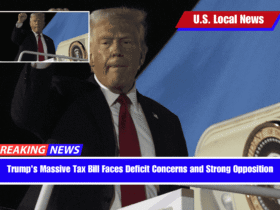On June 2, China’s Commerce Ministry criticized the Trump administration for actions it says are undermining the temporary trade truce reached on May 12.
The ministry highlighted new U.S. restrictions on exporting AI chip technology and chip design software to China, along with plans to revoke visas for Chinese students studying in the U.S.
Beijing’s Statement on U.S. Actions
China stated these moves “seriously undermine the existing consensus reached at the Geneva economic and trade talks” and harm China’s legitimate interests. These remarks came days after President Trump accused Beijing of violating the trade deal, raising fears of escalating tensions between the world’s two largest economies.
Expert Views on Trade Dispute and Policy Direction
Arthur Kroeber, a China analyst at Gavekal Research, expressed uncertainty about the coherence of U.S. trade policy, saying it remains unclear whether trade decisions come from Trump himself, his negotiators, or national security officials. He called the trade aggression’s objectives “muddled” beyond mere displays of power.
U.S. Treasury Optimistic About Future Talks
Despite rising tensions, U.S. Treasury Secretary Scott Bessent expressed confidence on May 31 that a resolution could soon be reached between Trump and Chinese President Xi Jinping, anticipating progress after their forthcoming discussion.
Market Reaction to Trade Concerns
U.S. stock markets reacted negatively to the uncertainty, with the S&P 500 falling by 0.2%, the Dow Jones dropping 0.4%, and the Nasdaq retreating 0.1% on Monday, reflecting investor worries over a potential trade war resurgence.
Details of the May 12 Tariff Pause
The temporary tariff truce initiated on May 12 was designed to last 90 days to allow negotiators more time. Under the deal, the U.S. agreed to reduce its tariffs on Chinese goods from 145% to 30%, while China lowered its tariffs on U.S. imports from 125% to 10%. Although this eased tensions, tariffs remain elevated compared to pre-escalation levels.
China Claims Compliance, Blames U.S. for Renewed Frictions
China asserts it has fulfilled its part by canceling reciprocal tariffs and suspending other trade barriers against the U.S. However, it accuses the Trump administration of provoking new economic conflicts and worsening instability through export restrictions and visa threats.
Visa Revocation Threats Stir Further Concern
The U.S. announcement to revoke visas of Chinese students—numbering over 275,000 on American campuses—has intensified discord. China views this move as a violation of the spirit of the trade agreement and an additional source of bilateral friction.
Economic Risks of Escalating Trade Conflict
Experts warn that a full decoupling or renewed tariff escalation could severely disrupt global supply chains and reduce demand for industrial commodities, dealing a major blow to the global economy.
Carl Weinberg, chief economist at High Frequency Economics, highlighted the severe consequences if the U.S. and China disengage further.











Leave a Reply